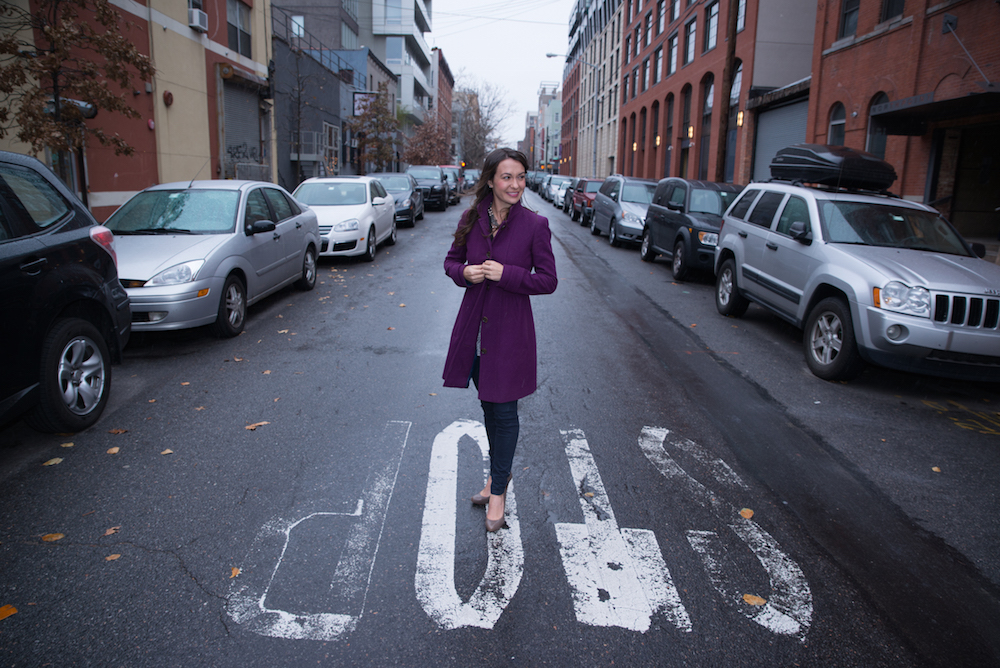I’ve always regarded my frugality as a means to afford the things I truly value. Being mindful of spending that doesn’t serve my priorities has been a critical part of enabling my life of passionate pursuit – specifically, my career as a professional actor.
But what if what you value in and of itself isn’t very frugal?
While Mr. Frugalwoods and I enjoy/attempt to survive our first few months as parents to our daughter, Babywoods, I have a delightful slate of guest posts from my friends lined up for your reading pleasure. Today, please welcome the lovely Stefanie O’Connell!
By: Stefanie O’Connell
 Unlike the stories of chance encounters on the street sky rocketing unknowns to celebrity stardom, the true pursuit of a career in professional acting is a costly endeavor. Every audition room I’ve ever set foot in has been packed with well trained, highly-educated individuals – the debt inducing price of which is just one line item on a long list of start-up career costs.
Unlike the stories of chance encounters on the street sky rocketing unknowns to celebrity stardom, the true pursuit of a career in professional acting is a costly endeavor. Every audition room I’ve ever set foot in has been packed with well trained, highly-educated individuals – the debt inducing price of which is just one line item on a long list of start-up career costs.
Dance shoes alone carry price tags upwards of $250, and quality professional headshots, another $800. Add on the expense of New York City living, center of the professional theater world, and the cost of ongoing skill maintenance – voice lessons at $150/hour, dance classes as $20 a pop and six-week acting classes at $800 – and the price of professional theatrical pursuit quickly becomes overwhelming.
Now if you’re sitting there thinking about how these costs compare to two years of grad school, they may not seem so heinous, but keep in mind the relative return on investment. According to NPR, just 17,000 of the 49,000 members of Actors Equity Association, the union for professional theater actors, are estimated to work in any given year. Of the members who do work, the median income from work in theater is just $7,500 per year. Subtract taxes, agent fees and union dues, and the number is only a few thousand, barely more than the cost of pursuit and insufficient in covering even the most minimal cost of living.
 I don’t know that return on investment is the best way to measure what you value, but I do know that the numbers and averages associated with this particular pursuit would be hard pressed to fit any definition of frugality. If you scrimp and save on nearly every expense, just to burn through your cash on one with minimal payoff, is it really frugal?
I don’t know that return on investment is the best way to measure what you value, but I do know that the numbers and averages associated with this particular pursuit would be hard pressed to fit any definition of frugality. If you scrimp and save on nearly every expense, just to burn through your cash on one with minimal payoff, is it really frugal?
You could argue that the value manifests in other forms like fulfillment, and I’d agree, but when you’re relying on that payoff as your primary income stream, things quickly become more complicated. Fulfillment doesn’t put food on the table, and it certainly doesn’t your diminish your student loans or credit card debt.
Saving where you can so that you can splurge where you want is the kind of frugal philosophy I’ve often championed. That said, both my numerical analysis and my personal experience as a professional actor have taught me that frugality can’t be practically applied without a critical level of earnings.
If you’re not making enough to meet the demands of even the most minimal costs of living which, at an average of $7,500 annually, you’re probably not – remember to consider the other side of the equation – making more.
 Instead of limiting my earnings pursuits to the already oversaturated market of professional acting, I began thinking of new ways to apply my skill set. I found that the creative thinking, storytelling and public speaking I’d mastered as an actor were in massive demand in nearly every other market, and so I began creating work that was both personally fulfilling and financially viable, simply by expanding the application of my skill set into markets with true demand – specifically, financial services.
Instead of limiting my earnings pursuits to the already oversaturated market of professional acting, I began thinking of new ways to apply my skill set. I found that the creative thinking, storytelling and public speaking I’d mastered as an actor were in massive demand in nearly every other market, and so I began creating work that was both personally fulfilling and financially viable, simply by expanding the application of my skill set into markets with true demand – specifically, financial services.
In shifting my focus away from ways to live on less and less, and finding ways to make more money, I stumbled upon the elusive financial freedom I’d so often read about. Frugality is an undoubtedly powerful tool, but the financial freedom frugality affords you only surfaces once you’ve reached a certain threshold level of earnings – enough to be frugal by choice rather than necessity.
So if you find yourself reading through all the tips and tricks on spending less, frustratedly thinking, “I’m doing all that and getting nowhere”- challenge yourself to tackle the other side of the equation: making more – and enjoy the freedom that the powerful combination of less and more can bring you!
Stefanie O’Connell is a millennial finance expert, professional actress and author of “The Broke and Beautiful Life,” a guide to living big dreams on a small budget.







I completely agree that, in order to live a bare-bones, frugal lifestyle and make great strides in your personal finances, you first need a decent income stream. The focus should definitely be on earning more and spending less. If you already earn less, there is no way to save more. I applaud your efforts to do exactly what you love and are passionate about while still maintaining a realistic view of finances. Your foresight and willingness to venture into other areas of income production is something to be shared with others in your situation. Two thumbs up!
Mrs. Mad Money Monster
Thank you! I’d love to inspire more artists to realize their full income potential!
I absolutely agree with approaching personal finance from both sides. It’s bothersome when people completely discount one side or other entirely. Your story illustrates well the need for both. The earning more angle can look differently for everyone; we are parents and volunteers, so we don’t spend all our free time side hustling. However, being willing to work toward & ask for a promotion, and even changing jobs and industries, have been ways we’ve increased our income without putting in too many extra hours during this stage of life. Thanks for sharing your story!
Asking for promotions and changing jobs/industries are great ways of increasing your earning potential that too many people shy away from. Congrats to you for doing it!
I do approach it from both sides of he equation.
We now pay for 2 houses because one of them is not selling in this saturated market. I was already working part-time (hubby works full time) but I had to take on a second part time job in order to pay for the second house until it sells. And we are being frugal, evaluating every dollar spent. It would not work with just one side (making more money and spending more or making less money and just being frugal with what we have with his job and my one part-time job).
Nice work! Working it from both sides (spending less and earning more) is the way big things happen 🙂
I agree that it’s not just the amount of money you spend that matters, it’s the difference between what you make and what you spend that matters. I’ve always been very good at the low spending part. I’ve never spent over $20K in any year and if you don’t count FICA, Federal or State taxes i’ve spent under $12K/yr for the last several years and will continue to do so but i’ve never made over $49K in a year and now i’m making half that so even though I spend less than most I still only have 10X my expenses in savings at age 36. I need to get to at least 25X expenses to be financially independent.
If you keep working on boosting that income and maintain your current spending, you’ll definitely fast track your way to financial independence.
I tend to believe that earning more + spending less is the ultimate combination to reach financial freedom. The key – and the hard part – is not ballooning your lifestyle along with your rising income. We’ve done pretty well at that over the years, and that’s why our increased earnings have actually helped us get ahead!
Now that I finally have increased means, it’s definitely harder to stay frugal. Spending just wasn’t an option before so it was easy to be frugal. It’s a bit trickier now, but I think I have a good balance 🙂
I like this article. It touches me personally in going and trying to live your dreams in such a materialistic society. It is so true this statement; The Things We Own Start to Own Us. As I become more aware and reflect back if I am living my dream I look at my past few years of purchases such as a new house, luxury cars and such. I realize are these material things helping me move forward or am I consistently hindering my progress toward my own personal happiness for short term enjoyment? I am a lucky one, Right Now, we have a big income. BUT for how long. Thanks for these messages it is helping now to put my behaviors in line with what my true dreams are to be.
So your message is earn more and you’ll likely be able to save more. Hmmm sounds like solid common sense to me. Finding the right balance in life is always a challenge; How much to save, how much to devote to entertainment, eating out and the things you love.
Those that are blessed with inexpensive likes are way ahead of the game. A $100 Golf Saturday vs a fishing rod with some $5 Walmart worms or veggie gardening. I deliberately avoided the golf thing- I just couldn’t justify several thousand a year chasing a little ball around. Others love it but it is all a trade off.
Wow, Stefanie, that is so interesting. I knew that many actors don’t make a great deal of money (even if they work hard and are very talented), but I had never thought much about the other side of it, i.e. the high cost of lessons and headshots and so forth.
I definitely need to focus on making more money. In the past year I’ve gotten really good at being super frugal, but now I need to start focusing on the other side of the equation. It’s so amazing how caught up we can get in trying to save a buck here or there, when our time might (sometimes) be better spent trying to increase our income. As you point out, both are important.
It’s definitely easy to get so caught up in saving that we neglect the other side of the equation. It’s been totally game changing.
This was very good. It’s a balance sometimes, no? Starting with around gen X, we were sold this bill of goods that we have to enjoy and be fulfilled by our jobs. It’s great if you can, but in the end you have to put food on the table.
In some ways it was easier for my dad who picked a job to support his family. Work was a means to an end. Now it seems like hours at work are increasing, and family time is dwindling.
Much of last night’s SOTU address spoke to me on this topic. The need to have your health care not be tied to a job. The understanding that you will have to retrain at some point.
I still fall back to the book “It’s called work for a Reason” by Larry Wingett. Just the title is enough to remind me of this.
I think our understanding of career joy is part of the problem. Too many people think that so called “boring” or “labor intensive” jobs automatically mean you’re giving up joy and that’s just not true. Fulfillment comes in so many more forms than we realize.
Back in 2010, Mr PoP was starting to read financial blogs and asked me, “What if we could save 50% of what we earn?” To which I responded, “I can’t get you to stop eating sushi out if you have cash in your pocket, how are we going to do that?” Well, 5.5 years later we stopped the sushi problem by keeping cash out of Mr PoP’s pockets, but also accelerated our savings by tripling our yearly combined earnings. The first is important, but the second is definitely the key behind our ability to put a ton of money away for the future.
Yep – each bit helps, but that earnings increase really kicks it into overdrive!
I love your summary point “..enough to be frugal by choice rather than necessity.” There’s so much truth in just that one statement. Great article Stefanie and great advice on remembering to look at both sides of our own personal balance sheets. cheers!
I too am dabbling in acting but I am fully aware that I have neither youth nor looks on my side. The costs of classes ere are lower though. I’m constantly looking for work that isn’t full time yet high dollar per hour. I am in as cheap an apartment as I can get. I also realize that I can intermittently take on full time work while taking classes. My degree is not in theatre, but business so that gives me a bit more leeway I think.
I think the real difference is where frugal is fun versus where it’s not. Frugal is more fun when you do have enough to live AND save, but it’s not so fun when you HAVE to live that way.
Thank you for this. Most frugal or minimalist blogs come from people who make more than twice the average income. I read them because they do have great ideas. However, like you stated, when your passion doesn’t pay well, you can only do so much.
I’m a social worker. Specifically I work with older adults, helping them to stay on their homes and as active as possible. I love it, and it’s incredibly rewarding and needed work. My work is dependent upon grants, and they’re small. It’s why so few people do this work. I’m concerned that I will need to leave the field I love for one I don’t, or else accept I won’t achieve FI. Or, I hope to do something similar to you in the future, where I do this work part time and something better paying the rest. I’ve been doing a lot of thinking on this lately.
I always draw a chart for clients with one line sloping upwards and that’s income and the line below it and parallel to it is lifestyle and I explain that the bigger the difference they can make between the two lines, the faster they will achieve their goals. You don’t just have to move the lifestyle line, people forget that you can move the top line as well.
Here’s something that was addressed in another financial forum/blog I read: health insurance costs, especially if your employer is no longer kicking in for its part.
One major blogger who talks about ER lives in Canada, which is a nation that provides health coverage to all its citizens He doesn’t seem to get that the U.S. is eating its citizens alive with inflated health care costs.
The only people not paying huge out of pocket costs in the U.S. are either those on Medicaid (the very poor or disabled), the very wealthy who can afford the best plans regardless of cost and those with good employer sponsored group health plans. Even Medicare now takes a big whack out of your pocket, regardless of income.
How can one have a decent early or for that matter, any retirement, with such exorbitant health care and insurance costs?
Mel810, I agree with your post. I retired 8 yrs ago at age 55. The first few years were fine until the Affordable Healthcare Act started. Affordable? No. Premiums skyrocketed, deductibles and out of pocket increased. None of this was anctipated on my part. I still look on the flip side of the paperwork in case I missed the “Affordable” part.
I’m paying far less with the ACA subsidies than I would be paying under the old system. I realize that it’s not a great deal for everyone but it is a better deal for most low income people who make too much for Medicaid but too little for full price coverage.
I qualified for Medicaid when I was acting, but now I pay out of pocket. It’s a big expense, but I know that I continue to increase my earnings, it won’t be such a huge portion of my budget anymore.
I think this article really gets at the heart of what financial independence is about. Some of us choose to work for a while in a situation that isn’t ultimately our dream job because doing so allows us to become financially independent in an amount of time that is acceptable for our lifestyle goals. Once financially independent, then you can pursue your ideal job (or lifestyle) without worrying about how much money you are making. But for others, that kind of trade off isn’t worth it for them, so they choose to work longer at a job they enjoy more. This has been a really tough decision for me. I have a job that I love but it is also very high stress and long hours. My goal is to hang in there until FI, then switch to something a little more relaxed.
I think the best part is that I stumbled upon financial independence and my dream job by moving away from what I thought was my dream job.
I walk a tight line between frugality and income. It has helped us dig our way out of debt and prepare for our future. I can only scrimo and save so much and without frugal living methods I could easily piss away every penny. It’s a ying and yang (with the occasional splurge here and there…I mean…Chipotle…mmm)
The combination of cutting expenses and earning more is such a powerful one-two punch. We started using it when we began paying off debt and have never looked back.
Yes–flexibility. Almost all the poor people I’ve known are what I call the “not willings”: not willing to stay at anything but their dream job, or not willing to buy anything second-hand, or not willing to live in a modest home, or not willing to move where their prospects would be a lot better. They might think of it as “having standards,” but really, they’re just closing a lot of doors and wondering why they can’t get ahead.
Yes! I was just thinking about this the other day, as I drove to my part-time job. No matter how much we can stretch a dollar, the flip side is we need dollars to work with. Sounds like you found a fabulous balance between doing what you love and earning to meet your goals! Thanks for sharing!
So true. I think what a lot of people don’t realize (and it sounds like you’re in the process of realizing) is that your passion doesn’t HAVE to be your career. It’s great if it is, but the objective of our jobs needs to first and foremost be sustaining ourselves and preventing us from falling into poverty. The fact is that many jobs will not be fun and fulfillment 100% of the time – if they were, you probably wouldn’t have to pay people to do them! Plus, people can always pursue their passions outside of work as hobbies or side hustles. Like acting or playing a musical instrument? Join a community theater company or orchestra. Like painting/sculpting/writing? No reason that can’t be done on nights and weekends.
I agree with this completely. I have always been frugal, but before I started earning more, frugality is what helped keep food on the table. Now that I earn more, frugality is what is helping us pay off debt while we don’t have to worry about where I next grocery run money is coming from.
2016 will be more on frugality and earning more. It’s definitely gonna be a challenging year, but I am hopeful that I can achieve most , if not all, of my goals.
Making more money is definitely the path to financial freedom, it gives you more options and you have more wiggle room to spend a little bit more while at the same time saving money!!
Have to ask: Hairspray?
Haha, no, but close -it’s shout. A 60s review 🙂
Great article. It definitely is about the 2 sides of the same coin: Spending less, and making more. Depending on one’s situation, one might be more realistic than the other. I’d say if your career choice gets you less than the equivalent of a full-time minimum wage job, then your focus *Should* definitely be on making more, before spending less.
Usually there’s something to take from posts here but this one had me floored to be honest.
‘Make more money’?
How ingenious – if you are young and in good health yes, you don’t have to worry unless there is high unemployment where you live, you can go flipping burgers or cleaning houses for the cash you need to survive.
But the idea that all we all have to do is ‘pull ourselves up by our bootstraps’ and we can all live without worrying about money ever again…
Wait until your first serious illness in the US and see what happens with the enormity of costs, ever increasing gaps in health coverage and physical inability to work for a while…
I think all the people who are working two or three jobs just to make it deserve more considerate advice than this, life is not easy for lots of people in the US. It’s a myth that working hard guarantees success- there’s a lot of luck involved and whether someone has family or community support if sickness or unemployment etc happens.
Making more is definitely important! Saving is limited by how much you earn. I like the quote “You can only save so much, but you can always earn more.”
I absolutely agree and it’s one of the reasons that college is a non-negotiable cost in my book. Just having the university attended line on my resume earns me double what I would have earned without it (believe me, I tried to go without it). It’s paid for itself time and time again.
My real love was dance but that’s not a life. There are more amazing dancers than there are fast food workers in America, and all of them competing for the same less-than-20,000 jobs doesn’t make for good outlook in the field. That plus, your performance years are limited due to the toll it takes on your body, and then you’re relegated to directing or teaching, which in the dance world isn’t much more than a public school teacher right out of college would make. I’m talking like $12 an hour, maybe. If you have seniority. And several years dancing professionally on your resume. What kind of income is that for the effort put out? 10 hour days of practice and rehearsals, year in and year out, for what? Fulfillment that doesn’t extend to a comfortable home and enough food to feed a family? And no time to spend with family either, due to 10 hour dance days on top of second and third jobs required to make rent. It’s just not a life.
I threw that life concept away and went into technology, based on the knowledge that I could fix basic computer things, and here I am 10 years later making great money and supporting my family. Because of the change I was able to buy my husband a car and pay for it all within a year, somewhere around $19k was the total amount spent. This year I’m spending about the same to buy myself a car, will pay it off in the next 6 months and then we will both drive them until they can’t be fixed anymore (ie, the next 10-15 years). We bought a comfortable home and hope to pay it off in the next 5 years by living on husband’s salary and putting 95% of mine into the mortgage. We don’t buy furniture, it’s all free stuff we got as hand me downs or off friends of friends. We don’t travel either, preferring to spend our vacation time on “staycations” to enjoy the house we spend so much money on already. Our child will hopefully have a great down payment on his own home gifted to him as a college graduation present, as we’re hoping to save one of our incomes 100% after paying off the mortgage, and we’d like to set him up nicely as well.
Neither of us come from wealthy families, no inheritances, no handouts from families (except the loan to us of a 12-year-old car before we bought one – we found out it was a good way for them to avoid paying insurance, and they don’t want it back!). We don’t spend money decorating the house or dressing fancy. We only buy what we need to look presentable and that’s it. I don’t do makeup much like you (not a drop), we don’t do fancy dinner out, if we go out it’s fast food and we only do that once a week. I changed jobs to work closer to home and also cut my hours down to 40 per week (previously anywhere from 45-60 plus a one hour commute each way!), which has saved us over $300 a month in childcare, $500 in lunches/coffee/gas/parking costs (requirements of my former position), and another $400 in takeout/fast food costs – now I’m home 2 hours before we get hungry and have time to put together dinner!
I drive 5 mins to work, and 5 mins back, so I save a TON on gas now. I could bike in the summer if I wanted, but I’m not concerned about the 3 mile commute and filling my tank once a month. Both husband and I bought the most fuel-efficient cars we could afford, so we’re now getting 40 mpg regularly. I used to get 25mpg, filling up weekly due to 50 mile commute daily, which came out to the same cost as the express bus to/from downtown. What a joke!
My new job also feeds me lunch for free – HUGE savings there. It’s close enough to go home for lunch, but cheap enough to not have to. They also provide fruit and bread in the morning, so it’s easy to get a free breakfast as well. It’s also paying me a good deal more than my previous position, which seems insane considering the benefits I get now, and how much I’m saving!
From personal experience I advise you all to follow the most logical financially responsible path, and save your hopes and dreams for your time off. You can make enough to live comfortably and not worry where your next meal is coming from, and you will still have enough time to pursue your passion on evenings and weekends. It’s a great compromise and it lets you sleep in on weekends.
Great Topic. I think that today everyone has lost the value of hard work pays off. That doesn’t mean you have to work endless hours for OK pay. Your life is what you make of it. Have Faith in yourself and what you are capable of. Anything is possible